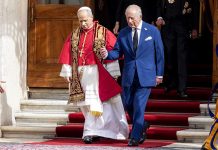In 1969, the Accra International Airport was renamed Kotoka International Airport, after General E.K. Kotoka was murdered on the airport grounds on April 17, 1967, by Lt. Sam Yeboah, in a failed coup attempt to topple the ruling National Liberation Council (NLC), of which Kotoka was one of the leaders.
The NLC struck on February 24, 1966 and overthrew Nkrumah and his CPP regime in the first successful coup in the country which was led by two Anlos (Ewes), Lt. Col E. K. Kotoka, from Alakple and Police Chief J.W.K. Harlley from Anyako and an Asante, Major A.A. Afrifa, from Asante Mampong.
Days after the coup, the country was thrown into a carnival with jubilation everywhere, as Ghanaians endorsed it as Godsent with freedom blowing all over the country. Even CPP government appointees openly condemned Nkrumah saying he deceived them. And with political prisoners released, the celebration reached its peak. Chiefs who were destooled by the government of Nkrumah triumphantly came back, while the politically enstooled ones fled, leaving their sandals behind.
But why the 1966 coup?
The country’s first constitution, the 1957 Constitution, guaranteed the rights of people, including the right to vote, the right to property and the rights for minorities. Then came the 1960 Republican Constitution which made turned Ghana into a republican state. The presidency was term-bound. In 1961 there was presidential election between Kwame Nkrumah (CPP) and J.B. Danquah (UP), which Nkrumah won with over 89% of valid votes cast.
By obviously adopting gross manipulations, Nkrumah was able to win 99% of valid votes cast in a constitutional referendum, on January 31, 1964 to establish a one-party state in Ghana.
He dissolved Parliament on May 25, 1965 and in the legislative election on June 9, 1965 with only CPP parliamentary candidates contesting, the party won all 198 seats. On June 10, 1965, Nkrumah was elected by the House as president for life. Ghanaians no longer had the right to change governments and Nkrumah became the Law, whatever he said was Law.
Meanwhile life was not going on smoothly in Ghana. Draconian law like the Preventive Detention Act (PDA) 1958, granted the president the power to arrest and detain individuals without trial if their actions were deemed harmful to the state; the False Report Act (1959), made it illegal to utter what was perceived to be false statement affecting the reputation of the country and government and the Chiefs (Recognition) Bill (1959), ensured that no enstoolment or destoolment could be effective unless it was formally recognised by the government, were among laws that abused the rights of the people, including our traditional authorities.
Ghanaians under Nkrumah suffered oppressions. The British colonialists were much better. Family life was destroyed with the Young Pioneers Movement, whose members who were children, whowould report their parents to the authorities for merely complaining about economic hardships and have them jailed.
Shortage of essential commodities worsened economic conditions. Cost of living shot up to dizzy heights and Ghanaians lived worse than during the colonial days. Hon. P.K.K. Quaidoo of the CPP, had this, in his book, “The Experience of Politics (A Manual for Ghanaians and African Politicians),” “Under the Slave Trade, Africans were enslaved on foreign soil. Under colonialism they are enslaved in Africa itself. Under the two systems, the perpetrators were foreigners and the victims were Africans. Under independence, the victims are Africans and the perpetrators were Africans themselves.”
Ghanaians were the victims, here. The Gold Coasters were under bondage of colonialism and prayed for independence which would bring freedom. When it finally came, it turned out to be worse than the days under the British. The British never decided who should be our traditional leaders, and never took away our rights, by jailing us without trial. They never turn our children against us and thus kept the family unit intact. The coming of self-rule under our own, came with the return of slavery, with all our rights taken.
This is what should be called a disgrace and not the coup of February 1966.
Nkrumah became the law and changed the Constitution to install himself, president-for-life. With Ghana in a one-party state the only way Ghanaians could change government was through a coup. And the 1966 coup did just that.
To date the Nkrumaists have hated Kotoka so much so, that they want his name removed from the international airport in Accra. Rawlings was petitioned to do this in the early days of the PNDC but he indicated that Kotoka was to be left alone, because he was a hero, who brought us democracy.
After thirty-six years of socialist rules in Ghana, the current NDC government is being petitioned to change the name of our airport in Accra. With Rawlings dead, the call has become stronger than ever.
Kotoka, Afrifa and Harlley, restored democracy and they must be honoured for that.
If Kotoka’s name must be removed, then the new name should have a Ga-Dangbe hero’s name in it. If Anlos will lose their revered name on that national icon, then an indigene’s name should be on it.
Kotoka, according to Rawlings, was a national hero and he must be respected and acknowledged as such.
Hon. Daniel Dugan
The views expressed in this article are the author’s own and do not necessarily reflect The Chronicle’s stance.








